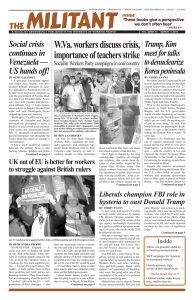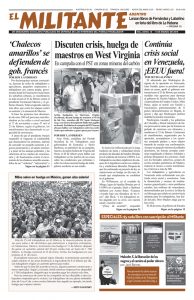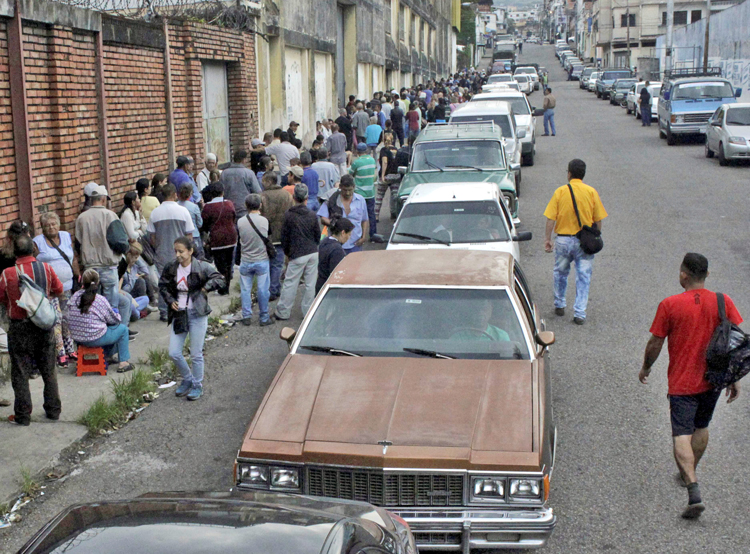U.S.-groomed Venezuelan opposition leader Juan Guaidó, who proclaimed himself president in January, appealed to Washington Feb. 25 to take more aggressive measures to oust the government of Nicolás Maduro. But Vice President Mike Pence, who met with Guaidó and government officials from 11 Latin American countries in Bogotá, brushed him aside and said Washington favors stepped-up economic pressure.
Washington, Guaidó and the governments of Colombia and Brazil provocatively attempted to move a handful of trucks with food and medicine across the Venezuelan border Feb. 23. Hundreds of opposition-organized protesters ran alongside the trucks throwing stones to escalate a confrontation.
While a small number of soldiers defected, the military brass is still backing Maduro. Soldiers and police blocked the trucks. Along with colectivos, pro-Maduro armed civilian groups, they killed at least four protesters and injured over 300.
Workers and farmers in Venezuela face a deep social and economic crisis. In the face of widespread malnutrition, shortages of medicine and other social ills 3 million Venezuelans — demoralized by the crisis and the lack of any leadership that points a way forward for working people — have fled the country, many to Colombia. But Maduro claims that there is no crisis.
On Jan. 28, Washington froze all Venezuelan government bank accounts held in the U.S. including those of the state-owned PDVSA oil company and its subsidiary, Citgo. On Feb. 25 Washington imposed additional sanctions. It is working people, already hard hit by the capitalist economic crisis and the policies of the Venezuelan government, who pay the price.
The Socialist Workers Party in the U.S. calls on workers to demand U.S. hands off Venezuela!
Chávez’s Bolivarian revolution
Hugo Chávez was elected president of Venezuela in 1998 in the wake of an upsurge by working people that took place over the previous decade. Chávez raised expectations among workers by vowing to end corruption and the “frittering away” of the vast oil wealth. Meanwhile, working people sought to advance their demands for land, jobs and gained confidence and experience in struggle.
However, Chávez, a former paratrooper, and the military officers around him — instead of leading working people on a revolutionary course — used oil profits to fund welfare programs. This demobilized workers and farmers and diverted them from taking power out of the hands of the capitalist class.
This is the opposite of how Fidel Castro and the July 26 Movement led Cuban workers and farmers to take political power into their own hands, and used their new government to advance their interests toward the overthrow of capitalist exploitation and oppression.
The attempts of the Chávez and Maduro governments to “administer” the capitalist market were doomed from the start. When oil prices plummeted, funding for welfare programs contracted. The crisis was made worse by policies that enriched a layer of the capitalist class and many in the military brass entrusted with running Venezuela’s oil and other industries, as well as by widespread corruption.
At the same time, the U.S. rulers hate the ties between Venezuela and the revolutionary government of Cuba. They fear workers in Venezuela and the Americas could see Cuba’s revolution as an example for themselves. Cuba sent tens of thousands of volunteers to help set up and staff medical clinics, teach in literacy programs, promote sports and as military advisers.
Washington aims to take advantage of the crisis in Venezuela to taint the image of the Cuban Revolution among working people by claiming that what exists in Venezuela is “socialism.”
Defend sovereignty of Venezuela
Those who tie opposition to U.S. interference in Venezuela to support for the policies of the Maduro government weaken the fight to defend the sovereignty of Venezuela.
As part of its call for protests demanding “Hands Off Venezuela!” the International Committee for Peace, Justice and Dignity says that under Maduro, Venezuela “is working and functioning normally despite the hysteria of chaos.”
How then to explain the empty store shelves, the long lines for subsidized necessities, the resurgence of malaria, diphtheria and measles, all of which began years before U.S. imperialism implemented any major sanctions?
Max Blumenthal, a liberal commentator who has written for the Nation, posted a video to YouTube Feb. 21 about his visit to the Gama supermarket in Caracas. He intersperses shots of this well-stocked supermarket with reports by mainstream U.S. media about empty shelves in stores throughout the country, implying those reports are false.
But Blumenthal leaves out some key facts. Gama caters to the upper middle class and capitalists, not working people. It specializes in imports. He picked up a bottle of olive oil and noted that it costs about $40 — three and a half times the monthly minimum wage.
Like working people in Cuba who took power in 1959, workers in Venezuela need to forge their own organization and leadership, in the face of difficult challenges today. Working people in the U.S. can give solidarity by demanding that Washington keep its hands off.


